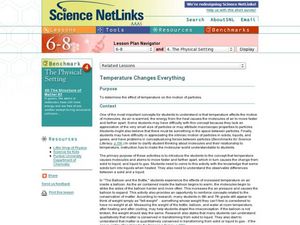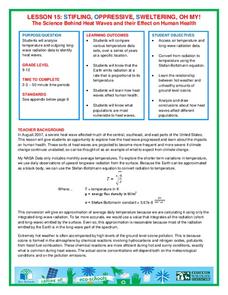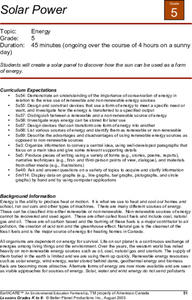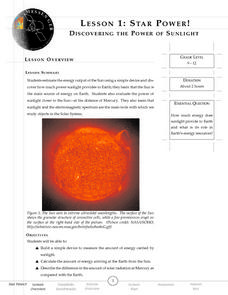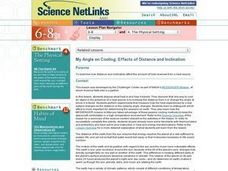Curated OER
Temperature Changes Everything
Middle school chemists visit interactive websites in order to discover what happens to molecular motion when heat is added to matter. They conduct an experiment that demonstrates the expansion of matter with the addition of heat. A lab...
Curated OER
When Things Start Heating Up
Fourth graders discover how heat is produced from human-based activities and mechanical and electrical machines. They discover characteristics of things that give off heat and those that don't. Students create a chart to record...
University of Waikato
Māui and the Sun
Using a Maori legend, How Maui Tamed the Sun, youngsters are introduced to the importance of sunlight to civilization. Teach them about nuclear fusion that occurs to produce the solar energy we later receive on Earth as electromagnetic...
Curated OER
A New Phase In Town
Middle schoolers explore heat energy and how it is used to change the phase of matter, and discover that temperature does not increase or decrease until the phase change is complete. This extremely well-written plan is packed with great...
National Wildlife Federation
Stifling, Oppressive, Sweltering, Oh My!
Looking for a hot date? Pick any day in August, statistically the hottest month in the United States. The 15th lesson in the series of 21 instructs pupils to investigate the August 2007 heat wave through NASA data, daily temperature...
Curated OER
TE Lesson: Using Heat from the Sun
Students examine fossil fuels, nuclear and renewable fuels. They study investigate types of heat transfer such as convection, conduction, and radiation. They complete crossword puzzles based on the vocabulary. They design, construct and...
Curated OER
Solar Energy Experiment
Students observe solar energy at work. In this science lesson plan, students watch two bottles, painted black and white, sit in the heat with balloons on the mouth of the bottles. They observe and discuss why the balloon of the black...
Curated OER
Heat Loss and Cool Gains
Fifth graders predict what happens when cold and hot water are mixed together. In this physics lesson, 5th graders discuss how heat transfer takes place. They record temperature readings and compare it with their prediction.
Curated OER
Thermal Energy
In this thermal energy worksheet, students answer 6 questions about substances that have greater thermal energy, substances that take more thermal energy to raise their temperatures and the heat lost and gained by substances.
Curated OER
Primary Energy Sources Pros and Cons
Students explore the different types of renewable and nonrenewable energy sources. For this earth science lesson, students discuss the pros and cons of each type. They conduct a variety of experiments on renewable energy.
Curated OER
Solar Power
Fifth graders create their own solar panel. They use this experiment to see how the sun can be used as a form of energy.
Curated OER
Latent Heat of Fusion
Students conduct a series of investigation on latent heat of fusion. In this chemistry lesson, students explain how thermal storage systems work. They draw and interpret graphs.
Curated OER
Discovering The Power Of Sunlight
Students participate in a lesson that looks at the potential for energy from sunlight. Students conduct research from a variety of resources and construct an object that is used to measure the energy of sunlight and calculate the amounts...
Curated OER
Solar Energy
In this solar energy worksheet, students read about the uses of solar energy, the benefits and the costs. They answer four critical thinking questions about solar energy.
Curated OER
My Angle on Cooling: Effects of Distance and Inclination
Students discuss what heat is and how it travels. They discover that one way to cool an object in the presence of a heat source is to increase the distance from it or change the angle at which it is faced.
Curated OER
What Causes Day and Night?
Why do we have four seasons? A series of questions about the Earth's orbit and its impact on seasons challenge Earth science students.The second page of the resource has nine multiple choice questions, such as "One year on Earth is one...
Curated OER
Particle Model of Solids, Liquids, and Gases
Display the arrangement of molecules in solids, liquids, and gases. Demonstrate how the addition of heat energy results in greater molecular motion and therefore a change of phase. Give examples of heat conductors and insulators, and...
Savvas Learning
Let's Get Moving
Scholars examine, cut, paste, and sort 12 images featuring different types of movement in order to show what they know about energy—potential and kinetic.
Texas State Energy Conservation Office
Investigation: Waves and Whistles
Wave goodbye to the same old demonstrations for alternative energy sources, and wave hello to this one investigating ocean waves! Using a water bottle to create an oscillating water column, learners see and possibly hear how the...
Curated OER
Survival Still
Lead your class to construct a solar still on campus to demonstrate how water can be extracted from the soil. The power of solar energy is emphasized, as is the concept of how capillary water can be recovered and purified by using a...
Curated OER
Energy Activities
Students conduct a variety of experiments related to solar energy, heating, cooling, gravity, physical insulation and wind. They consider how the experiments relate to energy and the consumption of energy and then participate in a class...
Curated OER
Olympic Solar Energy
Students use cardboard and aluminum foil to construct a solar oven that concentrates enough sunlight to cook a hotdog. They review the history and use of solar energy in relation to the Olympics.
Curated OER
Heat Transfer
Students examine heat transfer using energy efficient houses. In this heat transfer lesson students calculate the heat that is transferred between a system and its surroundings.
Curated OER
Thermal Energy: Temperature and Heat
Matter and the energy held by molecules is explained here. The information provided about the transfer of energy between substances and the resulting temperature change will be useful to your students. They will be able to work through...


